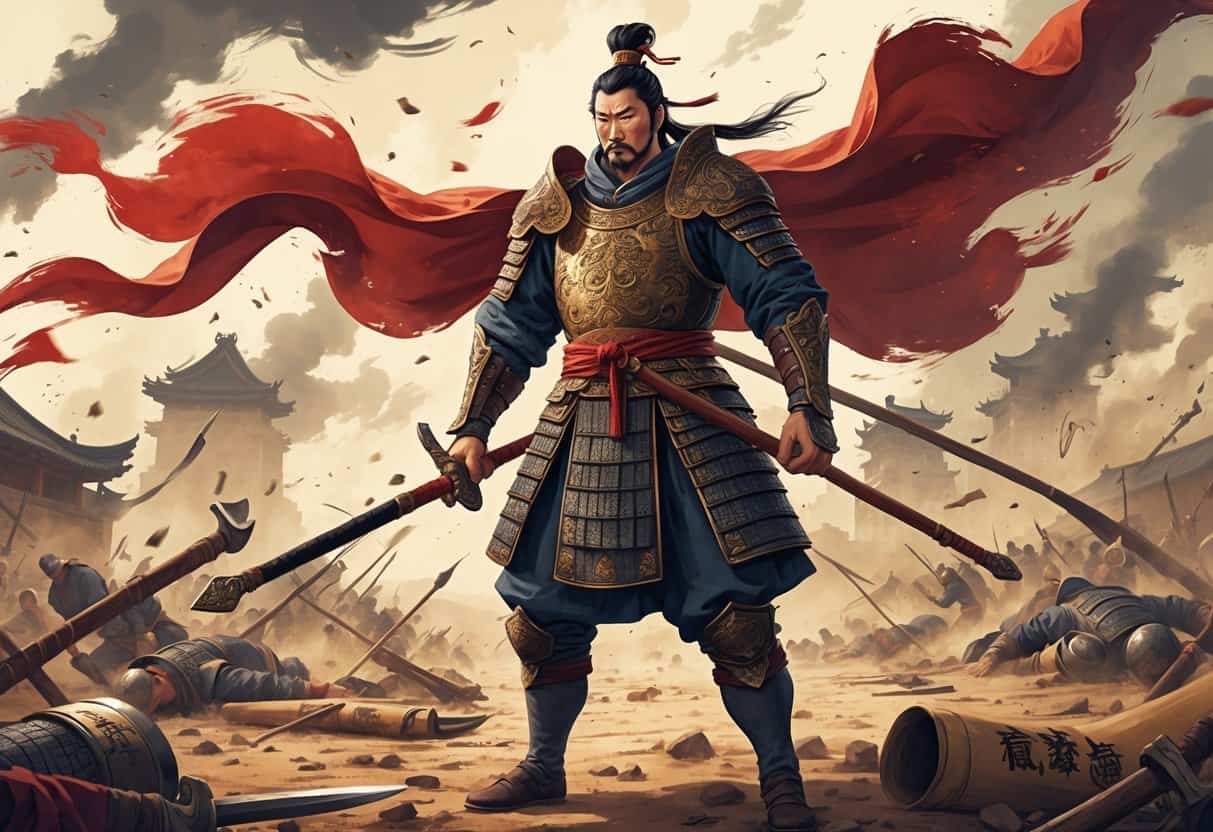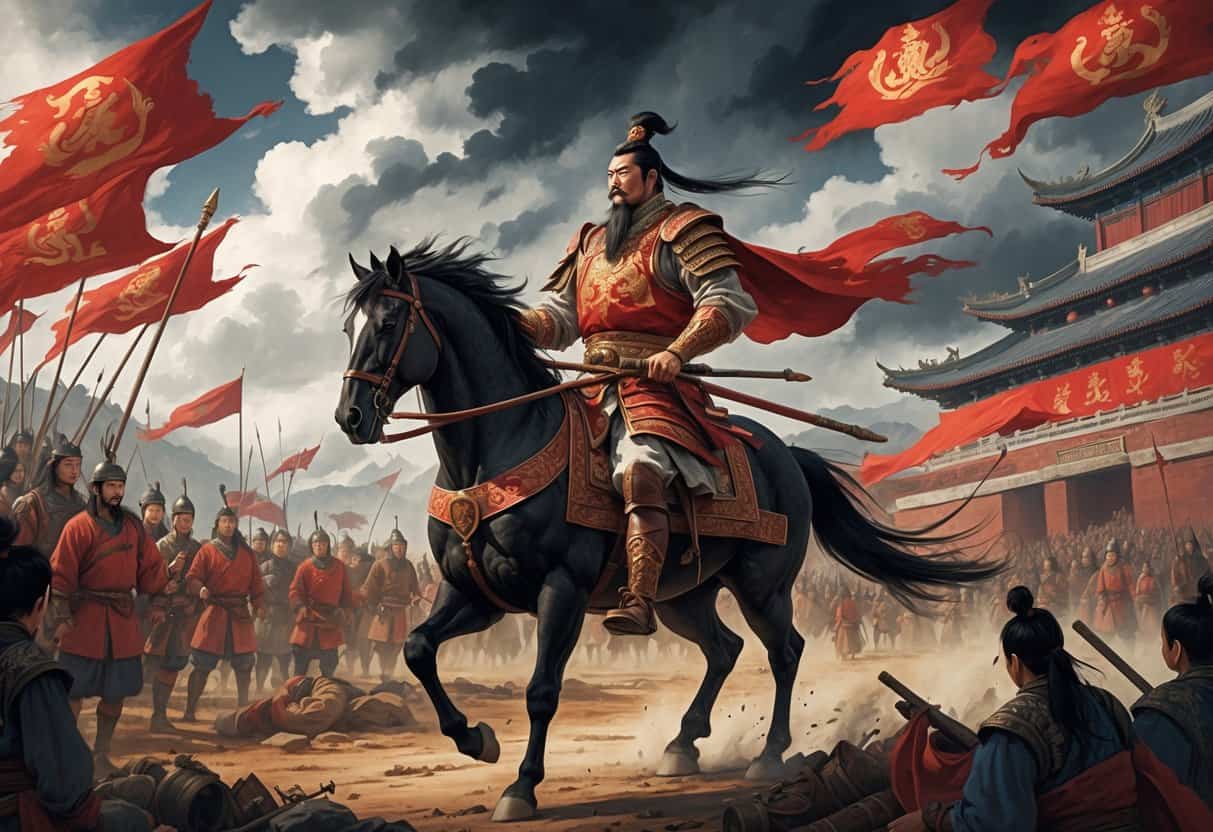Lu Bu stands out as one of the most powerful warriors from the Three Kingdoms era. Yet, his strength in battle didn’t guarantee him lasting success or real leadership.
Despite his legendary skills and terrifying reputation, Lu Bu struggled to keep allies. Holding onto power for any length of time proved difficult.

Lu Bu’s failures mostly came down to poor leadership and a pattern of betrayal. He couldn’t build trust, not with others, and not even within his own ranks.
His ability to fight was impressive, but it was overshadowed by his inability to form strong political alliances or manage his troops well.
Key Takeways
- Lu Bu’s battle skills didn’t make him a great leader.
- Trust and loyalty really matter for lasting power.
- Strength alone just isn’t enough to control a chaotic world.
Lu Bu’s Rise to Power and Reputation

Lu Bu’s rise was all about his fighting skills and military achievements. His reputation grew fast, but his personal choices shaped his fate as much as his sword did.
Origins and Early Life
Lu Bu was born into a family of warriors during the late Han dynasty. He got his start young, learning combat from an early age.
He first served under Ding Yuan, but then he betrayed him and joined Dong Zhuo. That first betrayal set the tone for his career.
From the beginning, Lu Bu looked powerful but also untrustworthy. He was a fighter with potential, but he struggled to make real friends in politics.
Military Skill and Might
Lu Bu’s physical strength made him stand out. His skill with the halberd and as a horseman was legendary.
He was known for his archery and as a cavalry commander. His fighting style was aggressive, sometimes overwhelming his enemies.
But he leaned too much on personal combat. That limited his effectiveness in bigger military campaigns.
Key Victories and Legendary Feats
Lu Bu built his reputation in several major battles. At the Battle of Xiapi, he put up a fierce fight against Cao Cao’s forces, but he was eventually defeated.
He held his own against famous warriors like Zhang Fei and Zhao Yun. That wasn’t just luck—he actually had the talent.
His cavalry charges could cause chaos. Still, his habit of betrayal kept weakening his alliances.
Strategic and Personal Failures
Lu Bu’s mistakes with alliances and decision-making cost him dearly. He couldn’t keep stable relationships, and his impulsive choices left him exposed, especially when facing rivals like Cao Cao and Liu Bei.
Unstable Alliances and Betrayal
Lu Bu’s alliances never lasted long. He usually acted for personal gain, not out of trust.
Betraying Dong Zhuo, his early ally, made people question his loyalty. That reputation stuck.
He never built deep partnerships, even when he worked with Yuan Shao or Liu Bei. His betrayals just created more enemies waiting to strike.
In a world where trust was everything, Lu Bu’s lack of stable alliances left him isolated.
Impulsive Decisions and Poor Strategy
Lu Bu was impulsive. He counted on his strength and reputation, not on careful planning.
When facing sieges or battles, he’d often attack without thinking things through. Missed opportunities to consolidate power or avoid fights piled up.
His unpredictability frustrated his officers and hurt morale. He lacked the strategic depth that leaders like Cao Cao used so well.
Rivalries and Enemies
Lu Bu faced tough rivals: Cao Cao, Liu Bei, Yuan Shao. They all turned his weaknesses into their own advantages.
His rivalry with Liu Bei is interesting—Liu Bei’s alliances with Guan Yu and Zhang Fei were solid, unlike Lu Bu’s.
Cao Cao, patient and cunning, exploited Lu Bu’s mistakes in both war and politics. Surrounded by enemies and lacking support, Lu Bu was doomed.
Cultural and Political Context
To really get why Lu Bu failed, you have to look at the customs and political systems of his time. His actions clashed with the values and structures that held the Han dynasty together.
Societal Traditions and Confucian Values
Confucianism shaped how leaders and soldiers were expected to behave. Loyalty and respect for authority were huge.
Lu Bu’s betrayals went against these values. In that culture, keeping promises and supporting your ruler was a moral duty.
His ambition led him to break these norms, making him seem untrustworthy. That reputation made it hard for him to build alliances or gain support.
Confucian values also demanded self-discipline and putting the group first. Lu Bu put himself first, and that hurt his standing.
Bureaucracy, Succession, and Legitimacy
The Han dynasty ran on bureaucracy and clear rules for succession. Power came from being recognized by the central government and emperor.
Controlling the palace and showing loyalty to the emperor meant legitimate authority. Lu Bu never really had that, since he switched sides so often and lacked official backing.
After Emperor Ling’s death, the political scene was a mess. Without court support or a clear claim to power, Lu Bu couldn’t secure his position.
| Key Aspect | Importance in Lü Bu’s Failure |
|---|---|
| Confucian loyalty | His betrayals lost trust and respect |
| Bureaucracy | Needed official support, which he lacked |
| Succession chaos | Destabilized power; he could not legitimize rule |
Legacy and Lessons Learned
Lu Bu’s story is a lesson in the limits of power without wisdom or loyalty. His life is a warning, but it’s also just plain fascinating.
Impact on Later Generations
Lu Bu’s story stuck with later generations studying leadership and loyalty. He’s often pointed out as proof that ambition without wisdom is a dead end.
Even though he was one of the strongest warriors, his lack of loyalty cost him everything. His failures are still used as examples—strength isn’t enough to win wars or keep power.
Teachers and scholars bring up his story to warn about betrayal and poor judgment. It’s a tale that keeps echoing, for good reason.
Portrayal in Literature and Popular Culture
Lu Bu is a big name in Romance of the Three Kingdoms, the classic by Luo Guanzhong. His courage and strength jump off the page, but honestly, he’s also known for switching sides way too fast.
That mix makes him so much more dramatic in Chinese literature. It’s hard not to remember a guy like that.
In popular culture, Lu Bu pops up in video games, like the SNES Total War: Three Kingdoms series. He’s usually shown as a powerhouse in battle, which, yeah, checks out.
Sometimes, his role gets mixed with magic or omens, tying him to other legendary Chinese stories—think Journey to the West. It’s a wild blend.
His story spreads far, from folks just picking up on history to people in Beijing and, really, all over. Makes you wonder—can you really hold onto power without a bit of wisdom or loyalty?